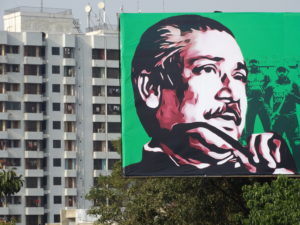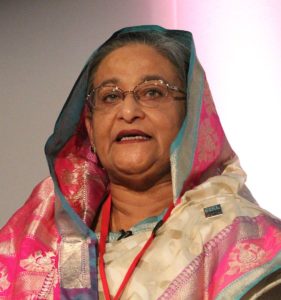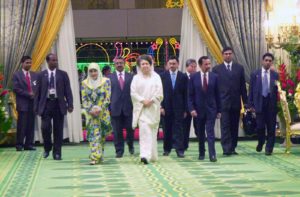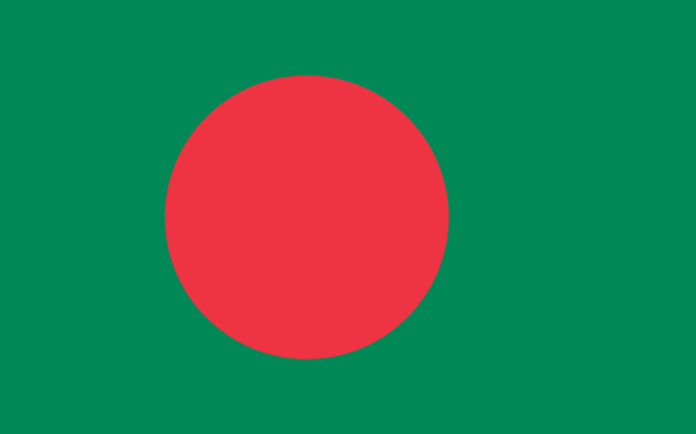As Bangladesh turns 50 we look at the successes and failures of a nation which has achieved some economic success but is mired in effective dictatorship, corruption and Indian dominance.
This week Bangladesh marked 50 years since its declaration of independence from Pakistan and the start of a brief but bloody and brutal war that ended in the emergence of the People’s Republic of Bangladesh as an independent nation, founded on the principles of nationalism, socialism, democracy and secularism.
Despite chaotic beginnings, its short history tells a tale of positive economic and social achievements yet the nation is still plagued by state oppression against political dissenters as well as allegations of corruption and electoral fraud at the highest levels.
Political power is mostly concentrated, like its South Asian neighbour and once fellow countryman Pakistan, in the hands of a few dynastic families leaving its initial aims of social equity and equality a distant dream.
The origins of Bangladesh
After the partition of India in 1947 the state of Bengal was split into East Bengal with Dhaka as its provincial capital joining newly created Pakistan, and West Bengal which joined India.
The Bangladesh independence movement is often cited as stemming from the tensions which arose only months after the departure of the British, when the Pakistani government made Urdu and English official state languages.
Subscribe to our newsletter and stay updated on the latest news and updates from around the Muslim world!
Although this decision was planned by the Muslim League in advance of partition, many Bengalis found it discriminatory and it sparked discontent and anger leading to agitations and unrest culminating in the tragic killing of student protestors by armed police in 1952. The Pakistani government justified its position stating it would not give national status to any ethnic language to maintain neutrality between the various ethnic groups, although it did eventually grant Bengali official language status in 1954.

Sheikh Mujibur Rahman, known today as the “Father of the Nation” to Bangladeshis, initially belonged to the socialist arm of the Muslim League in Bengal. He lobbied for and envisioned a separate nation state of East Pakistan from the early 1940s and following partition left the Muslim League to join the Awami Muslim League, later renamed as the more secular Awami League in an effort to appeal to non-Muslim Bengali communities.
In the period leading up to the creation of Bangladesh, Rahman would spend years in prison for resistance to Ayub Khan’s military rule but would also serve as a member of Pakistan’s assembly as well as a government minister.
His critics maintain Rahman never wanted East Bengal to be a part of the Pakistani nation, and that he began the Bengali Language Movement agitations to capitalise on perceived cultural marginalisation and stir up support for an independent state.
War of Independence
In March 1971 the independence war started which lasted for nine months and ended with Bangladesh officially having its status as an independent nation recognised in December 1971.
The conflict was sparked after elections were won by the Awami League who wanted to give the region more control over how things were run. Sheikh Mujibur Rahman started a campaign which involved breaking laws to show that they weren’t prepared to accept Pakistani domination. His supporters also attacked people who weren’t Bengali.
Meanwhile, the Pakistani army flew in thousands of extra soldiers, and attacked the Awami League.
Full-scale war broke out between the Pakistani army and a new unofficial liberation army who wanted total independence for East Pakistan. The fighting wasn’t just between the soldiers – ordinary people were attacked, robbed and taken from their homes and killed.
Millions of Bengali people decided to leave East Pakistan in search of safety, travelling as refugees to India’s Bengali state West Bengal. Seeing this the Indian armed forces got involved in the conflict, taking the side of Bangladeshi forces in the final two weeks of the war and helping them to secure victory.
But it would be unreflective of the political reality to deny or downplay that India’s material support for Bangladeshi independence against Pakistan came at little to no cost. From the very onset of Bangladeshi independence, India has had an overwhelming influence on the country’s foreign, domestic and economic policies, more so with the ruling Awami League Party, and this is evident in the way Bangladeshi police along with Awami League supporters violently cracked down on peaceful protests against Prime Minister Narendra Modi’s state visit last week.
In the end, the war of indepndence lasted for nine months with the Pakistani army surrendering on December 16, 1971.
Nobody knows exactly how many people were killed, but independent researchers think that between 300,000 and 500,000 died. The Bangladesh government puts the figure at three million.
Battle of the Begums
Modern Bangladesh’s political arena has been dominated by two women – the first is the current Prime Minister Sheikh Hasina, daughter of Sheikh Mujibur Rahman, who heads the Awami League (AL) party and since 2009 has led the country for three consecutive terms.
A military coup took place in 1975 in which her father was killed whilst she was abroad. She was granted asylum by India and was elected as AL president whilst in self-exile in 1981. She returned to Bangladesh the same year and has spent the next four decades at the forefront of its politics.
Her tenure has been marked by controversies of vote rigging at national elections in 2014 and 2018. Political opponents have faced arrest and detention and in 2013 she banned the large Islamic political party Jamaat e Islami on the basis that its values were not in line with the country’s secular constitution. Jamaat e Islami was a key member of the opposition coalition but they subsequently boycotted the 2014 elections in protest and the AL won a resounding victory largely due to the lack of an opposition party.

In 2018 the other leading lady of Bangladeshi politics Khaleda Zia, leader of the Bangladesh Nationalist Party (BNP), was jailed for embezzlement of funds from an orphanage for five years and was unable to participate in upcoming elections resulting in a landslide victory for Hasina.
Her supporters maintain the charges were politically motivated. Under the Bangladeshi constitution a person convicted of a crime with a term of imprisonment of more than two years cannot hold elected office. Zia also faces allegations in over 30 cases registered against her including charges of arson, sedition, charity fraud and corruption.
Clashes between her supporters and the police erupted when the verdict was announced with the BNP claiming hundreds of its supporters were arrested prior to the announcement of the court’s verdict.
Although Hasina and Zia are now political arch enemies, they somewhat surprisingly worked together in the 1980s to end the military rule of General Ershad and return Bangladesh to democracy. Like Hasina, Zia hails from the political elite. Her husband Ziaur Rehman was a former Bangladeshi Prime Minister who was assassinated in 1981 and her siblings and elder son are former BNP politicians.
Zia was elected as Prime Minister in 1991 in the first elections in the country for over 16 years. Hasina and the AL immediately accused her of voter fraud and boycotted Parliament, a caretaker government was installed and in the 1996 elections Hasina was elected as Prime Minister.
Power has yo-yoed between the two ever since with each taking the top job. Their political shenanigans means Bangladesh has suffered political instability in the forms of strikes, protests, arbitrary detentions, extrajudicial killings and a stunted political landscape.
Successes and failures
Yet under the combined leadership of Zia and Hasina over the past forty years, Bangladesh has achieved steady economic growth year on year with an annual GDP growth rate of 8.2% in 2020. It moved to lower middle income status in 2015 and looks likely to achieve the goal of leaving the UN list of least developed nations.
The country boasts the world’s second largest garment industry second only to China, making $35bilion annually from its clothing exports. 98% of children now complete primary school and infant mortality rates have fallen almost 40% in the past decade. It has become an unlikely and positive economic success story, and the World Bank predicts Bangladesh’s economy will see continued growth this year even in the face of the global Covid-19 pandemic.
But over the same period Bangladesh has moved away from democracy towards an almost complete political dominance of the AL under Hasina’s leadership.

In 2010 the AL set up the International Crimes Tribunal intended to investigate atrocities that took place during the 1971 war of independence; a move initially supported by the United Nations and international human rights organisations. But within three years the tribunal faced a rash of concerns from those same organisations including witness intimidation, state interference, the selection of pro-government judges and the kidnap of a defence witness who alleged state abduction.
For many the ICT is a thinly veiled political tool intended to clamp down on opponents of the AL. By 2012 most of the leaders of the Jamaat e Islami and some BNP politicians stood accused of war crimes in what many in opposition saw as a concerted witchhunt to eliminate them. At least six of those indicted have been executed or hanged.
In response Shafique Ahmed the AL Minister for Law and Justice said in 2012: “There is no scope for questioning the fairness and standard of the ongoing trial for war crimes during the Liberation War in 1971.”
Disabling dissent
In 2018 the Bangladeshi government introduced the Digital Security Act (DSA) which allows police to arrest anyone without a warrant for “spreading propaganda” against the Bangladesh war of 1971, the national anthem and national flag and the “father of the nation” Sheikh Rahman using digital devices.
Punishments can include huge fines and lengthy jail sentences. Since its inception at least ten editors of national and regional news outlets have faced legal charges after publishing news items critical of the AL government. Ordinary citizens are not exempt from its scrutiny – in February 2021 writer Mushtaq Ahmed died in prison after being detained for ten months under the DSA for writing a Facebook post critical of the government’s handling of the coronavirus outbreak.
Recently the DSA was used to remove an Al-Jazeera documentary that alleged links between Hasina, her close political circle, organised crime and the military.
So Bangladesh has certainly surprised the world in transforming itself from an underdeveloped fledgling state to a vibrant nation with widened access to education, a positive economic trajectory and rapid urbanisation of its capital, Dhaka.
But the stifling of political opposition, the growth of the urban poor, the lack of opportunities in rural areas, unsafe and harsh working conditions for its garment workers, and the curtailing of free speech to control government criticism must be addressed if it is to achieve its vision of equality and equity for all.


















